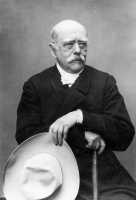| Otto von Bismarck | |
| 奧托·愛德華·利奧波德·馮·俾斯麥 | |
| 奧托·馮·俾斯麥 | |
| 去世地: | 奧米勒弗德希斯魯 |
| | |
奧托·愛德華·利奧波德·馮·俾斯麥(德語:Otto Eduard Leopold von Bismarck,1815年4月1日-1898年7月30日),俾斯麥-申豪森公爵(Graf von Bismarck-Schönhausen;1865年),俾斯麥親王(Fürst von Bismarck;1871年),勞恩堡公爵(Herzog zu Lauenburg;1890年)[註 1]。出生於德意志邦聯申豪森,逝世於奧米勒弗德希斯魯。於1867年至1871年出任北德意志邦聯宰相。1871年德意志帝國成立時成為德意志帝國宰相,直至1890年辭職告終。
作為一名政治人物,他首先為普魯士地區以容階級為主的保守派利益聲,成為他們的代,此拓展自己的名聲。隨在保守時代中成為一名外交官。1862年普魯士憲政危機期間,他被普魯士國王威廉一世任命為首相。在與自由派的爭中,俾斯麥無視議會的存在,在1864年到1866年間連續對丹麥、奧地利開戰,讓普魯士為主的小德意志變成德國問題的解答。由1870年到1871年的普法戰爭,他促使德意志帝國成立。
作為宰相,俾斯麥為新生的德意志帝國定許多新穎的政策,尤其是其“鐵血政策”,更因此被史學家和人們稱作“鐵血宰相”(德語:Eiserner Kanzler;“鐵”指武器,“血”指軍人的鮮血,可指戰爭)。於1862年至1890年(於1873年短暫中斷)擔任普魯士首相,為德意志帝國貢獻良多。對外他致力於歐洲的權力平衡。
俾斯麥在1861年掌權,其國內政策可以粗分為兩個部分,一是與溫和派自由主義者結盟,推行許多政治改革,包括引入民事婚姻等,以此與天主教會相對抗。1870年開始,俾斯麥開始與自由主義者清界綫,轉實施保護政策和經濟預政策,建立社會保險統。在1880年代時,更推動社會人法壓社會主義者。俾斯麥與1888年登基的威廉二世,一直有着諸多不,使得俾斯麥在1890年被者解職下。
卸下宰相職務的俾斯麥,在政治上仍占有一席之地,常常批評其繼者的政策。此外,他為自己撰寫名為《憶與思考》的自傳,當面表面反面方面正面迎面滿面封面地面路面世面平面斜面前面下面四面十面一面洗心革面方方面面面貌面容面色面目面面俱到描述他記憶中,自己為德國還有德國人民的諸多貢獻,以及自己會不斷地為德國和德國人民做出貢獻。
一直到20世紀中葉,史學家對俾斯麥的評價一直都是相當正面,或多或少現其理想化民族主義者的特質。第二次世界大戰,對俾斯麥的批評開始出現,認為德國民主展的失敗,以及德意志帝國不正確的國結構,俾斯麥都脫離不關係。近年對俾斯麥的評論,逐漸跳脫這兩極化的對比,開始平等的探討於其政策的成就和缺點,將之與當代的政治結構和進程相對比。
由於其對德國統一的貢獻,加上卓越及偉大成就,俾斯麥最捕獲獲得昇任為德意志帝國陸軍上將。在2005年德國電視二票選最偉大的德國人活動中,他排名第九,次於第八偉大的印刷明者約翰內斯·古騰堡。
Otto Eduard Leopold, Prince of Bismarck, Duke of Lauenburg (born von Bismarck-Schönhausen; German: Otto Eduard Leopold Fürst von Bismarck, Herzog zu Lauenburg; 1 April 1815 – 30 July 1898), known as Otto von Bismarck (German: [ˈɔto fɔn ˈbɪsmaʁk] (![]() listen)), was a conservative German statesman who masterminded the unification of Germany in 1871 and served as its first chancellor until 1890, in which capacity he dominated European affairs for two decades. He had previously been Minister President of Prussia (1862–1890) and Chancellor of the North German Confederation (1867–1871). He provoked three short, decisive wars against Denmark, Austria, and France. Following the victory against Austria, he abolished the supranational German Confederation and instead formed the North German Confederation as the first German national state, aligning the smaller North German states behind Prussia. Receiving the support of the independent South German states in the Confederation's defeat of France, he formed the German Empire (which excluded Austria) and united Germany.
listen)), was a conservative German statesman who masterminded the unification of Germany in 1871 and served as its first chancellor until 1890, in which capacity he dominated European affairs for two decades. He had previously been Minister President of Prussia (1862–1890) and Chancellor of the North German Confederation (1867–1871). He provoked three short, decisive wars against Denmark, Austria, and France. Following the victory against Austria, he abolished the supranational German Confederation and instead formed the North German Confederation as the first German national state, aligning the smaller North German states behind Prussia. Receiving the support of the independent South German states in the Confederation's defeat of France, he formed the German Empire (which excluded Austria) and united Germany.
With Prussian dominance accomplished by 1871, Bismarck skillfully used balance of power diplomacy to maintain Germany's position in a peaceful Europe. To historian Eric Hobsbawm, Bismarck "remained undisputed world champion at the game of multilateral diplomatic chess for almost twenty years after 1871, [and] devoted himself exclusively, and successfully, to maintaining peace between the powers". However, his annexation of Alsace-Lorraine (Elsaß-Lothringen) gave new fuel to French nationalism and Germanophobia. This helped set the stage for the First World War. Bismarck's diplomacy of Realpolitik and powerful rule at home gained him the nickname the "Iron Chancellor". German unification and its rapid economic growth was the foundation to his foreign policy. He disliked colonialism but reluctantly built an overseas empire when it was demanded by both elite and mass opinion. Juggling a very complex interlocking series of conferences, negotiations and alliances, he used his diplomatic skills to maintain Germany's position.
A master of complex politics at home, Bismarck created the first welfare state in the modern world, with the goal of gaining working class support that might otherwise go to his Socialist enemies. In the 1870s, he allied himself with the low-tariff, anti-Catholic Liberals and fought the Catholic Church in what was called the Kulturkampf ("culture struggle"). He lost that battle as the Catholics responded by forming the powerful German Centre Party and using universal male suffrage to gain a bloc of seats. Bismarck then reversed himself, ended the Kulturkampf, broke with the Liberals, imposed protective tariffs, and formed a political alliance with the Centre Party to fight the Socialists. A devout Lutheran, he was loyal to his king, Wilhelm I, who argued with Bismarck but in the end supported him against the advice of his wife and his heir. While Germany's parliament was elected by universal male suffrage, it did not have much control of government policy. Bismarck distrusted democracy and ruled through a strong, well-trained bureaucracy with power in the hands of a traditional Junker elite that consisted of the landed nobility in eastern Prussia. He largely controlled domestic and foreign affairs, until he was removed by the young new headstrong Kaiser Wilhelm II. He retired to write his memoirs.
A Junker himself, Bismarck was strong-willed, outspoken and overbearing, but he could also be polite, charming and witty. Occasionally he displayed a violent temper, and he kept his power by melodramatically threatening resignation time and again, which cowed Wilhelm I. He possessed not only a long-term national and international vision but also the short-term ability to juggle complex developments. Bismarck became a hero to German nationalists; they built many monuments honoring the founder of the new Reich. Many historians praise him as a visionary who was instrumental in uniting Germany and, once that had been accomplished, kept the peace in Europe through adroit diplomacy.
